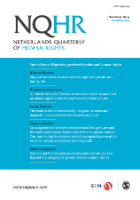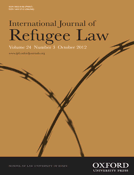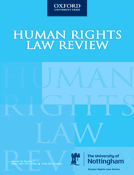
Netherlands Quarterly of Human Rights
Scope & Guideline
Elevating Critical Conversations on Human Rights
Introduction
Aims and Scopes
- Human Rights Law and International Standards:
The journal extensively covers developments and interpretations of international human rights law, including the roles of key institutions such as the European Court of Human Rights and the UN Human Rights Committee. - Interdisciplinary Approaches to Human Rights:
It encourages contributions that intersect with various disciplines, including law, sociology, political science, and cultural studies, to explore how human rights are understood and implemented across different contexts. - Emerging Human Rights Issues:
The journal addresses contemporary challenges such as climate change, digital rights, and migration, providing a platform for discussing how these issues impact human rights norms and protections. - Cultural and Historical Perspectives:
There is a consistent focus on the historical and cultural dimensions of human rights, examining how past events and cultural contexts shape current human rights practices and legal frameworks. - Sustainable Development and Human Rights:
The journal explores the synergies between sustainable development goals and human rights, emphasizing the need for an integrated approach to address global challenges.
Trending and Emerging
- Digital Rights and Technology:
There is a growing emphasis on the implications of technology for human rights, particularly concerning privacy, surveillance, and the impact of digital agriculture on the right to food and science. - Climate Change and Human Rights:
The intersection of climate change and human rights has become a prominent theme, with increasing discussions on environmental justice, rights of nature, and the role of human rights in addressing ecological crises. - Sustainable Development Goals (SDGs) and Human Rights:
The relationship between sustainable development and human rights is trending, with papers exploring how human rights frameworks can support the achievement of SDGs, particularly in the context of renewable energy and land rights. - Intersectionality in Human Rights:
Recent articles have highlighted the importance of intersectionality, examining how various identities and social positions influence the experience and protection of human rights, particularly regarding gender, race, and migration. - Business and Human Rights:
The discourse around business responsibilities and human rights has gained traction, focusing on legal frameworks and the role of corporations in upholding human rights standards.
Declining or Waning
- Traditional Human Rights Violations:
Focus on classic human rights violations, such as torture and arbitrary detention, seems to be less prevalent as new themes like climate change and digital rights gain attention and urgency. - Historical Case Studies:
There has been a noticeable decrease in papers that solely focus on historical case studies of human rights abuses, as the journal increasingly prioritizes contemporary issues and their legal implications. - General Discussions on Human Rights Frameworks:
Articles that provide broad overviews of human rights frameworks without specific case studies or contemporary relevance are appearing less frequently, indicating a shift towards more targeted and practical analyses. - Non-legal Perspectives:
There is a waning interest in purely theoretical or philosophical discussions of human rights that do not connect to practical applications or current events, as the journal seeks to emphasize actionable insights.
Similar Journals

International Journal of Refugee Law
Shaping the future of refugee studies and legal frameworks.International Journal of Refugee Law, published by Oxford University Press, is a leading peer-reviewed journal that has significantly contributed to the field of refugee studies since its inception in 1989. With an ISSN of 0953-8186 and an E-ISSN of 1464-3715, this journal provides a vital platform for interdisciplinary dialogue on issues related to migration, asylum, and the legal frameworks that govern refugee rights. It holds an impressive reputation within the academic community, as evidenced by its 2023 category quartiles—ranking Q2 in both Demography and Law, and Q3 in Management, Monitoring, Policy, and Law. Additionally, it boasts notable Scopus rankings, positioned in the 66th percentile among Law journals and the 50th percentile for Demography, indicating its relevance and impact. Researchers, professionals, and students engaged in these fields will find invaluable insights through its rigorous analyses, case studies, and policy discussions, albeit it operates under a traditional subscription model without open access. As the journal continues its mission through to 2024 and beyond, it remains instrumental in shaping discourse and understanding of contemporary refugee law, ensuring it is a must-read for anyone invested in the social sciences and legal studies.

AJIL Unbound
Fostering Open Dialogue in Legal ScholarshipAJIL Unbound is an esteemed open-access journal published by Cambidge University Press that has been serving the legal academic community since 2013. With its focus on international law and related social science disciplines, this journal offers a platform for innovative research and critical discourse in the field. Thanks to its robust engagement features and commitment to accessibility, AJIL Unbound facilitates the dissemination of knowledge while fostering scholarly communication among researchers, practitioners, and students. With a notable ranking of #192 out of 1025 in the realm of Social Sciences Law, it stands in the 81st percentile, showcasing its influence and reach within the legal field. Its open-access model enhances visibility and encourages wider participation in discussions surrounding pressing legal issues. As the journal continues to converge its objectives from 2013 to 2024, it remains a vital resource for academics looking to explore contemporary legal challenges and advancements.

Revista Catalana de Dret Public
Illuminating the Future of Public LawRevista Catalana de Dret Public, published by the esteemed Escola Administració Pública Catalunya, stands as a pivotal resource in the fields of Law and Public Administration. With its roots dating back to 1985, this open-access journal has established itself as a significant platform for scholarly dialogue and research dissemination, benefiting a diverse audience in Spain and beyond. The journal is currently categorized in the Q2 quartile for Law and Q3 for Public Administration, with Scopus rankings reflecting its critical role in the academic landscape—positioning it at the 37th and 20th percentiles respectively. Furthermore, the Revista Catalana de Dret Public operates under an open-access model, ensuring that vital research is freely available to all, thereby enhancing knowledge sharing and collaboration within these fields. Through rigorous academic scrutiny and a commitment to public discourse, this journal aims to illuminate contemporary issues and foster advancements in public law and administration, making it an essential read for researchers, professionals, and students alike.

Alternative Law Journal
Elevating Diverse Voices in Legal Scholarship.Alternative Law Journal, published by SAGE Publications Ltd, stands as a pivotal platform for critical discourse within the fields of law, sociology, and political science. Since its inception in 2008, the journal has fostered innovative scholarship aimed at exploring the intersections of legal practices and social justice, making it an essential resource for researchers, practitioners, and students alike. With its current ranking at Q3 in both the Law and Sociology categories according to the latest Scopus metrics, the Alternative Law Journal ensures a robust academic discourse, promoting diverse perspectives and challenging conventional norms. The journal's address reflects its international reach, further underscoring its commitment to fostering a global dialogue on pressing legal and societal issues. This journal is crucial for anyone seeking to stay updated with contemporary thoughts and research impacting law and society.

Age of Human Rights Journal
Championing Knowledge for Global JusticeAge of Human Rights Journal, published by UNIV JAEN, SERV PUBLICACIONES, serves as a pivotal platform for scholarly discourse in the fields of Law, Political Science, and Sociology, with a specific focus on the promotion and protection of human rights. Since its establishment in 2013, this open access journal has enriched the academic community by providing a vital forum for innovative research, critical analyses, and interdisciplinary collaboration. Operating from Jaén, Spain, it maintains a commendable position within Q3 quartiles for various related categories, reflecting its growing influence and relevance, as indicated by its rankings in Scopus. The journal aims to not only disseminate knowledge but also to foster dialogues that challenge existing paradigms and advocate for the advancement of human rights globally. With continuous contributions through 2024, the Age of Human Rights Journal remains an essential resource for researchers, professionals, and students committed to understanding and improving human rights practices worldwide. Access to its comprehensive array of articles and insights is conveniently available, enhancing its role in the academic landscape.

Journal of East Asia and International Law
Illuminating the Evolving Legal Landscapes of East AsiaThe Journal of East Asia and International Law, published by the YIJUN Institute of International Law, serves as a vital platform for scholarly discourse in the field of law, with a particular focus on the complexities of East Asian legal systems and their interactions within the global context. Established in 2011 and based in Seoul, South Korea, this journal has been pivotal in fostering research that examines legal issues impacting East Asia, making significant contributions to the understanding of international law in this dynamic region. With its ISSN 1976-9229, the journal provides a valuable resource for researchers, professionals, and students interested in the evolving legal landscapes of East Asia. Though currently categorized in the Q4 quartile for law in the Scopus rankings, its dedication to enhancing legal scholarship positions it as a relevant player among emerging international law journals, encouraging submissions that explore innovative legal approaches and analyses. As ongoing interdisciplinary discussions deepen, the Journal of East Asia and International Law aims to enrich the academic community's understanding of international legal frameworks within East Asian contexts.

Ius Humani-Revista de Derecho
Advancing Human Rights Discourse GloballyIus Humani-Revista de Derecho, published by Universidad Hemisferios, serves as a vital platform for discourse in the field of human rights law and its various dimensions. With an Open Access policy established since 2008, this journal ensures that scholarly articles, critical reviews, and original research are readily accessible to a global audience, fostering collaboration and innovation among researchers, professionals, and students alike. Although the journal is based in Quito, Ecuador, its reach extends internationally, making significant contributions to the understanding and application of human rights in legal frameworks. While it is still developing in terms of its HIndex and Scopus rankings, Ius Humani is poised to provide essential insights and discussions that reflect pressing legal issues and emerging trends in human rights law. Join the community of scholars engaging with this important field through Ius Humani, where knowledge is freely shared and impactful conversations are sparked.

Business and Human Rights Journal
Championing the cause of human rights in the corporate world.Business and Human Rights Journal is a leading academic publication dedicated to the intersection of corporate responsibility and human rights, published by CAMBRIDGE UNIVERSITY PRESS. Since its inception in 2016, the journal has rapidly established itself as a vital resource for researchers, practitioners, and academics in the fields of Business and International Management, Industrial Relations, Law, and Sociology and Political Science, achieving a distinguished Q1 ranking in multiple categories in 2023. The journal's emphasis on contributive research and innovative perspectives fosters a critical dialogue on the responsibilities of businesses in ensuring human rights within their operations. With a robust impact factor and high Scopus rankings—placing it in the top 15% of Social Sciences Law and 25% of Sociology and Political Science—the Business and Human Rights Journal is essential reading for those engaged in advancing human rights in business practices globally.

Human Rights Law Review
Exploring the Intersection of Law and Human DignityHuman Rights Law Review, published by Oxford University Press, is a premier academic journal dedicated to the advancement of scholarship in the field of human rights law. With a distinguished ISSN of 1461-7781 and known for its impactful contributions, the journal has achieved a remarkable reputation, being classified in the Q1 Quartile in Law and Q2 Quartile in Sociology and Political Science as of 2023. Boasting a notable Scopus ranking of #227 in Law and #505 in the social sciences, the journal is a vital resource for researchers, legal professionals, and students alike, facilitating critical discourse and the dissemination of groundbreaking research from 2005 to 2024. The Human Rights Law Review is committed to exploring the complexities of human rights within legal frameworks, thereby enriching the global understanding and advocacy of these essential rights. As a principal outlet for scholarly work in this vital area, the journal features a wide range of articles that not only examine legal provisions but also interrogate the sociopolitical contexts impacting human rights worldwide.

Revista CES Derecho
Illuminating the Path of Legal Research and Analysis.Revista CES Derecho is a distinguished academic journal published by UNIV CES, focused on the multifaceted field of law. Situated in Medellin, Colombia, this journal serves as a vital platform for disseminating innovative research and critical analysis in legal studies, encouraging the exchange of ideas among scholars, practitioners, and students alike. With its commitment to open access, the journal provides unfettered access to its content, ensuring that its valuable insights reach a diverse audience. Although specific metrics such as H-Index and Scopus rankings are currently unavailable, the Revista CES Derecho aims to enhance the quality of legal education and practice by fostering scholarly discourse and informing progressive legal thought. Researchers and practitioners are invited to contribute to this dynamic publication, further enriching the discourse in the ever-evolving landscape of law.